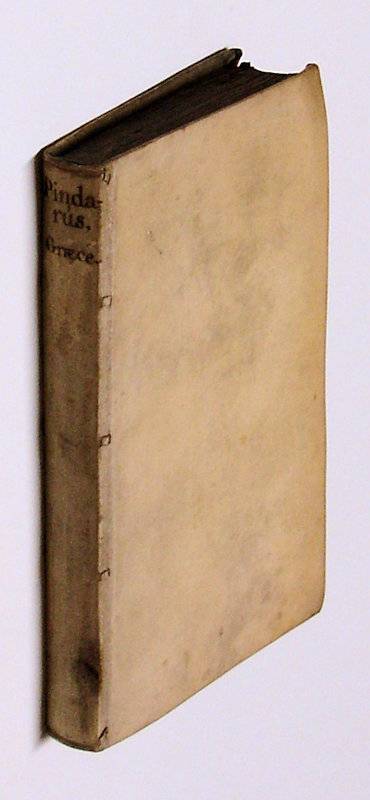PINDARUS.
PINDAROU OLUMPIA, PUTHIA, NEMEA, ISTHMIA. Pindari Olympia, Pythia, Nemea, Isthmia.
Leiden (Lugduni Batavorum), Ex officina Plantiniana, Apud Franciscum Raphalengium, 1590.
8vo. (XVI),246,(4 blank) p. Vellum. 16 cm (
Ref: Hoffmann 3,98; Graesse 5,294; Ebert 16858) (
Details: Woodcut printer's mark on the title, it depicts a hand that comes out of a cloud, and draws a circle with a pair of compasses, the motto is: 'Labore et constantia'. Short biography of Pindar by Gyraldus in Latin precedes the Greek text of the epinicia. Greek text only) (
Condition: Vellum age-tanned. Some small wormholes in the blank upper corner of the first gathering, smaller pinpoint ones in next six gatherings, nowhere affecting the text. The edges of the lower corner of the first gathering eaten away by some insect) (
Note: A quarter of the works of the Greek poet Pindar, ca. 518-438 BC, his four books of 'epinicia', named after the Great Games, the Olympian, Pythian, Nemean and Isthmian, survive. Pindar wrote eulogistic hymns to celebrate a victory in athletics, boxing and horse racing. Praised in a magnificent way are the victor, his family, the native city. 'Each ode draws from a variety of historical, cultural, and mythological sources. The highly allusive manner by which this material is presented is complemented by an equally rich repertoire of metrical patterns from epic, Doric, and Aeolic systems'. (The Classical tradition, Cambridge Mass., 2010, p. 729) 'Extended similes and difficult metaphors, intricate syntax and rapid narration, far-reaching digressions and bold disruptions' result in grandiose, but also obscure, enigmatic and sometimes seemingly awkward poetry. Already in antiquity the comic playwright Aristophanes presented in the 'Aves' Pindaric poetry as foolish, pretentious and embarrassing. The Hellenistic poets Callimachus and Theocritus wrote poetry under his influence. The Roman poet Horace thought him grandiose and sublime. Pindar's influence on European literature is great. The great number of editions in Greek, and Latin translations of Pindar's odes that were printed in the 16th century are an indication of a continuous and widespread humanist interest. Many of Pindar's gnomic maximes and punctuated statements, containing elements of traditional wisdom, were collected in Renaissance anthologies of 'sententiae', for example in Erasmus's Adagia. Already the first full Latin translation of Pindar (1528) indexed all the gnomes according to moral lessons. 'The sententious Pindar (...) provided the Humanists of the Reformation with pithy statements of moral instruction and wordly advice, which ensured the poet's place in pedagogical circles'. 'The sheer variety of Pindarically influenced traditions -the political ode and the personal, the religious hymn and the song of genius, the freely aimless and the rigorously concise- all serve as a testament not only to Pindar's versatility, but also to his rich potential to inspire'. (Op. cit. p. 730) For Filelfo, Pontano, Cowley, Dryden Pindar was a model for political encomium, and there are quite a number of imitators of Pindar in European literature. Giangiorgio Trissino wrote a tragedy and three canzoni in a form approximating Pindar's practice, Luigi Alamanni modelled his hymns on the Pindaric ode, Ronsard wanted to be the French Pindar, introducing the Pindaric ode into the vernacular literature of France. The French author Voltaire made the witty remark that Pindar wrote verses that no one understood, and everyone had to admire. For Thomas Gray, Goethe and Hölderlin he was a genius.
§ This Pindar edition of 1590 is based, according to Hoffmann, Graesse & Ebert, on the Greek text of the edition of 1560 produced by the French scholar/printer Henri Estienne (Henricus Stephanus). Stephanus published a second (1566) and third edition (1586), all three containing in addition to the Greek text a Latin translation of the odes, but the 1560 edition is to be preferred, because the Greek text is, according to Dibdin the most correct. Plantin published a reissue of the Greek text of this 1560 edition earlier in 1567. Greek text only) (
Provenance: On the front pastedown in pencil: '18 april 1961', written by the Flemish linguist Walter Couvreur, 1914-1996, who was an Orientalist, and professor of Indoeuropean linguistics at the University of Gent. It indicates the date of aquisition. The place of acquisition he wrote on the flyleaf at the end: 'Utrecht, Beijers, veiling Wille'. On the front flyleaf an illegible name, and 'J. Wille, 10 febr. 1928'. J. Wille, 1881-1964, was professor of Dutch literature and linguistics and at the same time librarian of the protestant Free University at Amsterdam. His specialty was 18th century Dutch literature, and an excessive buyer of books. His books were auctioned by Beijers at Utrecht on the 23rd, 26-27th april 1961. It was the largest private library ever auctioned by Beijers. (P.J. Buijsters, 'Geschiedenis van de Nederlandse bibliofilie, boek- en prentverzamelaars 1750-2010', Nijmegen, 2010, p.110/11; including a picture of Wille) (
Collation: *8, A-P8, Q6 (leaves Q5 & Q6 blank) (Photographs on request)
Book number: 120117 Euro 385.00
Keywords: (Oude Druk), (Rare Books), Dichtkunst, Greek literature, Griechische Literatur, Isthmian Odes, Nemean Odes, Olympian Odes, Pindar, Pindarus, Poesie, Pythian Odes, antike altertum antiquity, poetry
 PINDARUS.
PINDARUS.